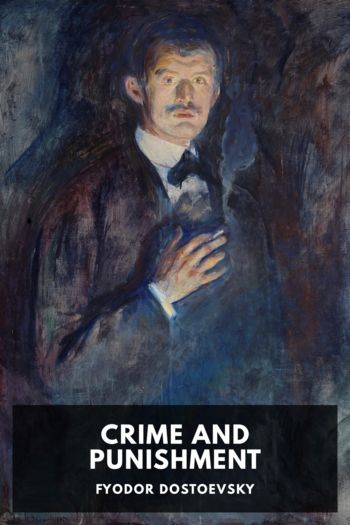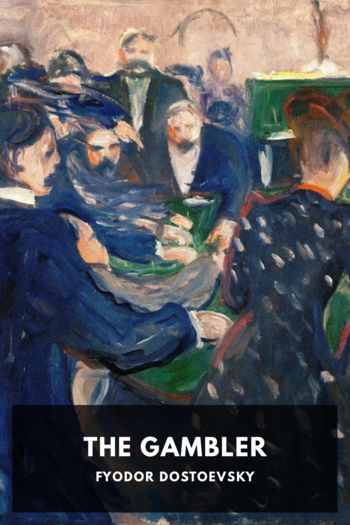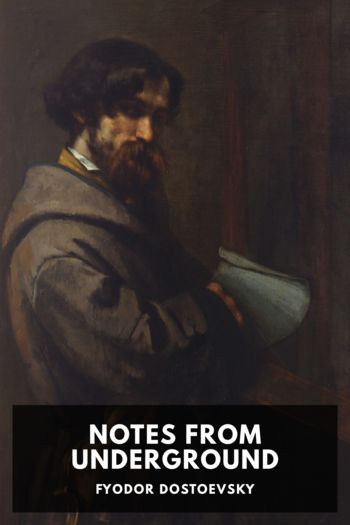Crime and Punishment by Fyodor Dostoevsky (love novels in english TXT) 📕

- Author: Fyodor Dostoevsky
Book online «Crime and Punishment by Fyodor Dostoevsky (love novels in english TXT) 📕». Author Fyodor Dostoevsky
Raskolnikov looked strangely at her. He read it all in her face; so she must have had that thought already, perhaps many times, and earnestly she had thought out in her despair how to end it and so earnestly, that now she scarcely wondered at his suggestion. She had not even noticed the cruelty of his words. (The significance of his reproaches and his peculiar attitude to her shame she had, of course, not noticed either, and that, too, was clear to him.) But he saw how monstrously the thought of her disgraceful, shameful position was torturing her and had long tortured her. “What, what,” he thought, “could hitherto have hindered her from putting an end to it?” Only then he realised what those poor little orphan children and that pitiful half-crazy Katerina Ivanovna, knocking her head against the wall in her consumption, meant for Sonia.
But, nevertheless, it was clear to him again that with her character and the amount of education she had after all received, she could not in any case remain so. He was still confronted by the question, how could she have remained so long in that position without going out of her mind, since she could not bring herself to jump into the water? Of course he knew that Sonia’s position was an exceptional case, though unhappily not unique and not infrequent, indeed; but that very exceptionalness, her tinge of education, her previous life might, one would have thought, have killed her at the first step on that revolting path. What held her up—surely not depravity? All that infamy had obviously only touched her mechanically, not one drop of real depravity had penetrated to her heart; he saw that. He saw through her as she stood before him. …
“There are three ways before her,” he thought, “the canal, the madhouse, or … at last to sink into depravity which obscures the mind and turns the heart to stone.”
The last idea was the most revolting, but he was a sceptic, he was young, abstract, and therefore cruel, and so he could not help believing that the last end was the most likely.
“But can that be true?” he cried to himself. “Can that creature who has still preserved the purity of her spirit be consciously drawn at last into that sink of filth and iniquity? Can the process already have begun? Can it be that she has only been able to bear it till now, because vice has begun to be less loathsome to her? No, no, that cannot be!” he cried, as Sonia had just before. “No, what has kept her from the canal till now is the idea of sin and they, the children. … And if she has not gone out of her mind … but who says she has not gone out of her mind? Is she in her senses? Can one talk, can one reason as she does? How can she sit on the edge of the abyss of loathsomeness into which she is slipping and refuse to listen when she is told of danger? Does she expect a miracle? No doubt she does. Doesn’t that all mean madness?”
He stayed obstinately at that thought. He liked that explanation indeed better than any other. He began looking more intently at her.
“So you pray to God a great deal, Sonia?” he asked her.
Sonia did not speak; he stood beside her waiting for an answer.
“What should I be without God?” she whispered rapidly, forcibly, glancing at him with suddenly flashing eyes, and squeezing his hand.
“Ah, so that is it!” he thought.
“And what does God do for you?” he asked, probing her further.
Sonia was silent a long while, as though she could not answer. Her weak chest kept heaving with emotion.
“Be silent! Don’t ask! You don’t deserve!” she cried suddenly, looking sternly and wrathfully at him.
“That’s it, that’s it,” he repeated to himself.
“He does everything,” she whispered quickly, looking down again.
“That’s the way out! That’s the explanation,” he decided, scrutinising her with eager curiosity, with a new, strange, almost morbid feeling. He gazed at that pale, thin, irregular, angular little face, those soft blue eyes, which could flash with such fire, such stern energy, that little body still shaking with indignation and anger—and it all seemed to him more and more strange, almost impossible. “She is a religious maniac!” he repeated to himself.
There was a book lying on the chest of drawers. He had noticed it every time he paced up and down the room. Now he took it up and looked at it. It was the New Testament in the Russian translation. It was bound in leather, old and worn.
“Where did you get that?” he called to her across the room.
She was still standing in the same place, three steps from the table.
“It was brought me,” she answered, as it were unwillingly, not looking at him.
“Who brought it?”
“Lizaveta, I asked her for it.”
“Lizaveta! strange!” he thought.
Everything about Sonia seemed to him stranger and more wonderful every moment. He carried the book to the candle and began to turn over the pages.
“Where is the story of Lazarus?” he asked suddenly.
Sonia looked obstinately at the ground and would not answer. She was standing sideways to the table.
“Where is the raising of Lazarus? Find it for me, Sonia.”
She stole a glance at him.
“You are not looking in the right place. … It’s in the fourth gospel,” she whispered sternly, without looking at him.
“Find it and read it to me,” he said. He sat down with his elbow on the table, leaned his head on his hand and looked away sullenly, prepared to listen.
“In three weeks’ time they’ll welcome me in the madhouse! I shall be there if I am not in a worse place,” he muttered to himself.
Sonia heard Raskolnikov’s request distrustfully and moved hesitatingly to the table. She took the book however.
“Haven’t you read it?” she asked, looking up at him across the table.
Her voice became sterner and sterner.
“Long





Comments (0)